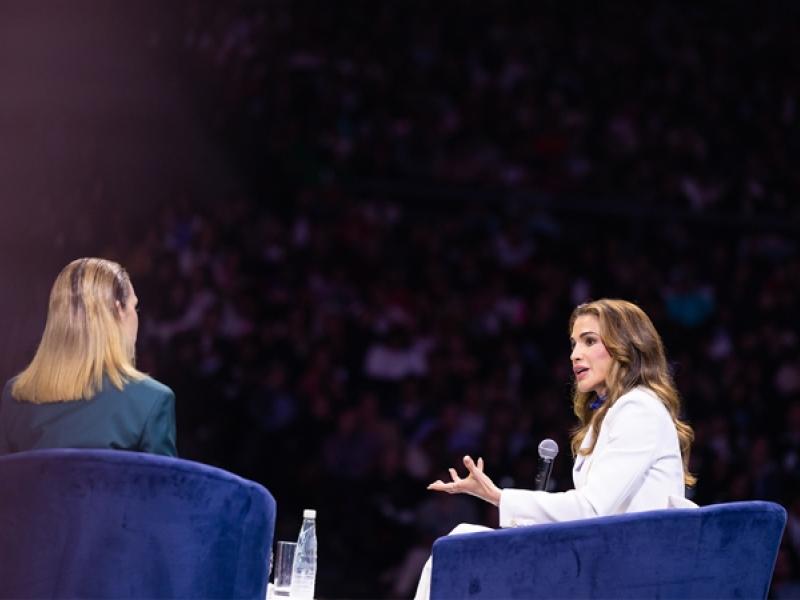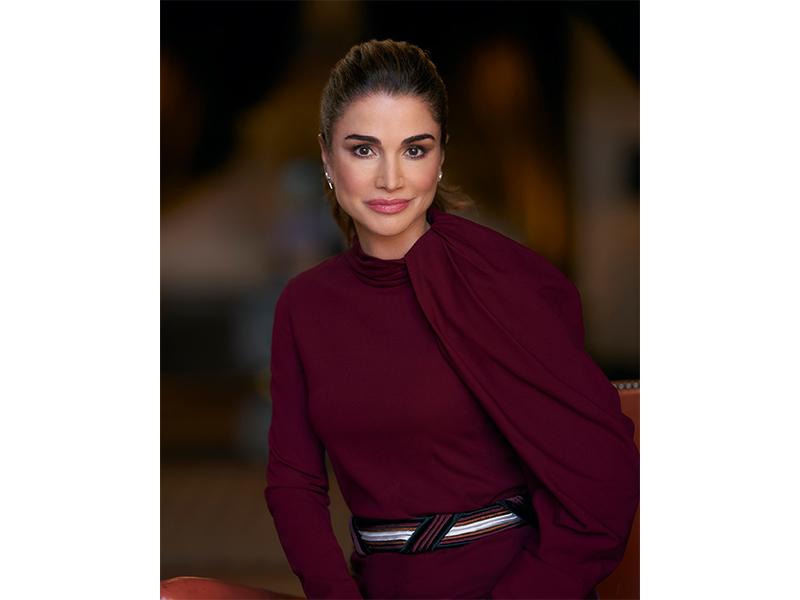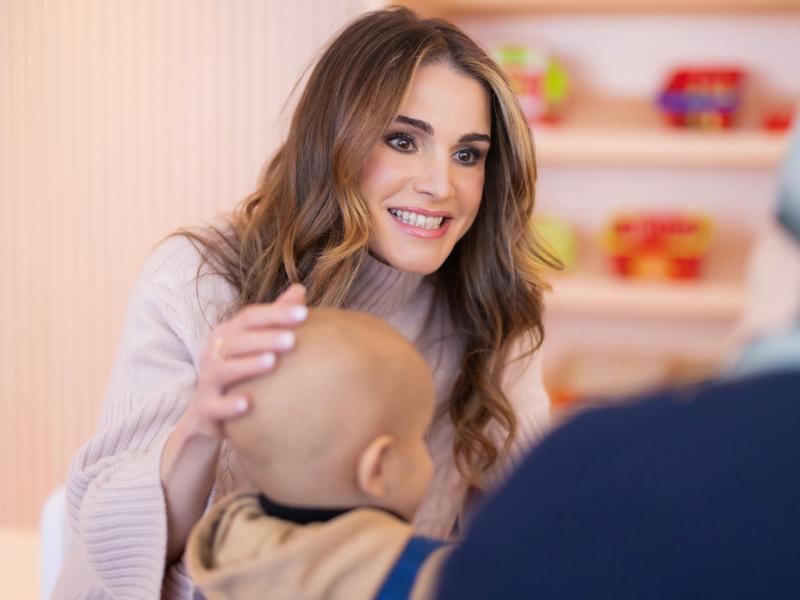Queen Rania of Jordan was the guest of honor at the Mosaic Foundation Gala. In an exclusive interview for WL, ABC-7 News Anchor Kathleen Matthews captures the young Queen candidly discussing the push and pull of modernity and tradition in the Arab world, the evolving role of women in the region, and her love of films and vegging out at home watching 24 and Desperate Housewives.
QUEEN RANIA: AN EXCLUSIVE INTERVIEW
At 35, Her Majesty has a world of experience behind her ... and a world of expectations ahead
She's a queen who admits to zoning out in front of the TV while watching her favorite shows, Desperate Housewives and 24. On the weekends, she and her husband cook on the barbeque grill in their palace garden and watch movies. "Being Queen is not who I am, but what I do," she recently told Oprah Winfrey. Her Majesty Queen Rania Al-Abdullah of Jordan is showing the world a new face of Arab women and it's perhaps the most beautiful face in the world. After meeting Jordan's royal couple, King Abdullah bin Al-Hussein and Queen Rania, at a private lunch hosted at their palace in Amman in honor of Catherine and Wayne Reynolds, I began an email exchange with the Queen for Washington Life magazine.
During our exchanges, she was in the midst of a fourday working trip to three U.S. cities to promote cross-cultural understanding between U.S. and Arab youth and children. One of those stops was here in Washington, where she was the honored guest alongside First Lady Laura Bush at the Mosaic Foundation 9th Annual Benefit Dinner to raise money for a new Arab-language Sesame Street program.
In a town that has its fair share of kings, queens, presidents, premiers and princesses passing through, Washingtonians were dazzled by the young Jordanian queen, not only for her beauty, but for the power of her words and passion about educating women in the Middle East and around the world. "In my mind, poverty is a she," she told Oprah during her recent U.S. tour. And while she also confessed that she was "terrified" when she became Queen at age 29, Rania is using her throne to improve the lives of women, children and families around the world. In June, she will host women leaders from around the globe at the Dead Sea for a conference to make sure that girls everywhere have access to education.
Back in Jordan, as my husband Chris and I drove to meet the royal couple at their home, we passed several billboards of King Abdullah, Queen Rania and their four children ages 12 to one-year old. She has come a long way. Born in Kuwait, this daughter of a Jordanian doctor of Palestinian descent fled with her family to Jordan when Saddam Hussein invaded. She went on to earn a degree in business from the American University in Cairo and worked in banking before marrying (then) Prince Abdullah thirteen years ago.
When we arrived for lunch at their new palace, which they waited 10 years to build, King Abdullah grinned warmly as he and his wife greeted their American guests. Like the newly built mansions in Potomac, squares of green turf are still piled up to complete the landscaping and sprinklers keep the new growth alive in a country that is more rock than rich loam. The architecture is Islamic but inside it could be Santa Fe. I ask Queen Rania about the design: "The main idea was to have a 'home' not a 'palace' - that was really important for us as a family … you know, somewhere that is warm and cozy," she writes. "Of course, it has to be friendly and relaxed for entertaining, and yet it also needs to cater for the more formal aspect of our lives. The architecture is Islamic which I have a great passion for, and the interior is quite contemporary … accentuated with Islamic artifacts which encapsulate what Jordan is all about … tradition and modernity comfortably side by side."
The traditional Jordanian meal is at mid-day and begins with hot and cold Arabic mezza, a selection of finger-foods that are served prior to the main meal. The palace dining room is a blend of elegant modern furniture with Islamic accents. It could be any Washington dinner party with lively conversation that flows from politics to culture. As King Abdullah discusses the challenges facing his country and his region, Queen Rania listens intently but doesn't hesitate to add her views. What emerges in their give and take is a true partnership between a modern king and his well-educated, deeply reflective wife, who is also thoughtful enough to serve her American guests pecan pie with vanilla ice cream for dessert - she doesn't miss a detail
Over lunch, she describes how her husband, King Abdullah, has taken great risks to be a beacon in the efforts to promote peace in the Middle East. "I am very proud of my husband's leadership in Jordan, in our region, and beyond. He firmly believes that leaders have a responsibility to reach out beyond their own borders, engage the rest of the world, and build a community of partners to mobilize real change - and he's 'walked that talk,' carrying Islam's message of peace, tolerance, and moderation to people of all faiths, in all corners of the world, from political leaders in Asia to high school students in America to business men and women on the global stage."
As a Palestinian woman, Queen Rania speaks passionately about her hopes for a Palestinian state. "I believe that establishing a viable Palestinian state is crucial not just for stability in our region, but for security around the world. I would say the same, regardless of whether or not I was of Palestinian origin myself. For too long, people in our region have been weighed down with conflict and all its burdens. Their days are punctuated with images of despair and destruction, horror and heartbreak. For Americans, the conflict between Israelis and Palestinians may be a distant problem, but for us in the region, we live it every day.
These are the harsh realities for thousands of our region's youth, on whom our future depends, and I believe that all of us who care about peace and progress share a responsibility to restore security to their lives and ensure they have opportunity, hope, and a sustainable economic future." Like her husband, Queen Rania is Muslim and prays five times a day, at sunrise, mid-day, in the afternoon, evening and every night. She makes clear that faith plays an important part in her life, but values personal choice in the way women publicly express their faith.
"I believe that tradition and modernity can move forward together, and I think we're seeing evidence of that in a number of places in the Middle East. If you walk down the streets in Amman, you'll see some women in traditional dress and others in more contemporary fashions - and you may well see a woman wearing a veil and tailored business suit as well, speaking perfect English into the mobile phone pressed to her ear. I don't wear a veil myself; it's a matter of personal choice. But I think that many in the West mistakenly view the veil as a symbol of oppression, when in fact it's a sign of modesty, piety, and devotion to God. We need to be careful not to base our judgments of people on outward factors, such as appearances. If we do that, we risk relying on stereotypes that prevent us from looking deeper below the surface."
Fluent in both English and Arabic, Queen Rania displays an impressive command of current American cinema. "I thought Syriana was very thought-provoking in that it captured the complexities and nuances of our region, and cast a light on the magnitude of the challenges we face," she says. "Crash was another film which left me thinking; the interconnected stories were both sobering and fascinating. I thought that this film was a brave, and necessary, attempt to explore and confront racial attitudes and deep-rooted stereotypes that exist in society. These two films have succeeded in really making people consider issues from a different perspective. That's very valuable." The young Queen strikes me as woman who has given a great deal of thought, not only to the movies she sees, but also to the challenges of her region and the full potential of her position. "I never expected my life to turn out the way it did. I certainly never aspired to be a queen; but here I am, and this extraordinary privilege has given me a rare opportunity and platform from which to speak for those whose voices might not otherwise be heard. I take that responsibility very seriously.
So many of the issues people care about in Jordan - like peace, and jobs, and health care, and education - are concerns shared by others around the world, especially in developing countries. That's why I support organizations like UNICEF, the Global Alliance for Vaccinations and Immunization Fund, the World Health Organization, and the Foundation for International Community Assistance, which are all, in their own ways, striving to close the "hope gap" that separates people from birth into those who have a future and those who don't." But Queen Rania also shares in the mission with her husband to communicate the message of Jordan and its people to the rest of the world. "We want people to be aware of what I like to call 'the other Middle East,'" she says with a determination that belies her years. "I do not want people to see only negative images which too often fill the television screens. Rather, I want them to see in Jordan a land rich in culture, full of potential and populated by peace-loving citizens. That's the Middle East I know and love."
A CULTURAL MOSAIC
Star-studded gala heralds the arrival of Sesame Mosaic across the Arab world
First Lady Laura Bush was there, so was Queen Rania Al-Abdullah of Jordan and all the Arab Ambassadors and their spouses. But with all the diplomatic and political notables inside the National Building Museum, it was a pair of Muppets who stole the show - beloved Elmo and Khokha from the Egyptian Sesame Street co-production, Alam Simsim. The major benefi ciary of Mosaic Foundation's Ninth Annual Benefi t Gala “Education: A Two Way Street” was Sesame Mosaic, a project designed to educate preschool children in the Arab world and the U.S. about mutual respect, and basic literacy and math.
Standing in front of a dramatic backdrop of colossal columns and fl owing 60-foot curtains, gala honorary chair Laura Bush and guest of honor Queen Rania, both spoke of breaking down cultural barriers and offering early education to children. With the amount of daily press focused on the war on terror, it was a welcomed respite to hear of a U.S. and Arab initiative that strikes at the core of cultural misunderstandings. “President Bush and I thank you for your dedication and your service, and we especially appreciate your commitment to strengthen the ties between America and the peoples of the Arab world,” said the First Lady before passing the podium to Queen Rania, who dazzled in an emerald green Gucci gown paired with a traditional Jordanian belt
The Mosaic Foundation (www.mosaicfound. org) is an American charitable and educational organization founded and run by the spouses of Arab Ambassadors to the United States. To date, the foundation has awarded more than $8 million to organizations improving the lives of women and children globally and increasing understanding and appreciation of Arab culture in the United States. Gala Chair Luma Kawar, the wife of the Jordanian ambassador, opened the evening by elaborating on the theme “Education: A Two Way Street,” saying: “The free-flow exchange of goods and ideas depends on trust. The foundation of trust is understanding which can only be attained through communication.” Sesame Workshop, the nonprofi t educational organization behind Sesame Street and Alam Simsim, has a long history in the Arab world. In 1979, the Workshop created its fi rst production in Arabic with Iftah Ya Simsim in Kuwait.
The organization has since established coproductions in Jordan and Palestine. Now, with the support of the Mosaic Foundation, more Arab children will be exposed to literacy skills and the diversity of cultures thanks to the creative puppetry of the Sesame Workshop. Episodes are to be shot in Arabic with messages focusing on education and common understanding.
One should only look as far as Egypt to see the positive impact Sesame Mosaic can have. In a country where over 50 percent of women are illiterate, Khokha stands as a role model for girls. One day, she wants to be a doctor. On another, she aspires to be a pilot. And on yet another day, she wants to become a librarian … inspiring a generation of Egyptian girls to do the same.
Khokha: You're involved in many charities focusing on women and children; why is Sesame Mosaic important?
Queen Rania: Just as “America” is not a monolithic bloc, but a glorious mosaic of fi fty different states and a multitude of communities, each with their own special character, so too the Arab region encompasses a wide variety of cultures, customs, and experience. Sesame Mosaic will encourage Arab children to explore the world they inhabit - to be proud of where they come from and how much they have to offer, and to participate actively in the intercultural exchange that inspires and enriches humanity.
Khokha: What impact do you think television shows about Arab children will have in the U.S.?
Queen Rania: It's important to learn about people different from themselves. But just as important as teaching children to appreciate each other's differences, a show like Sesame Mosaic can help reveal the many ways in which we're all the same. We all love our families. We all cherish our friends. We all have passions, hopes, and dreams - and worries too. My hope is that Sesame Mosaic, and other similarly inspired initiatives, can help all our children grow up with a genuine sense of fellowship with others around the world.
© Copyright, Washington Life Magazine


